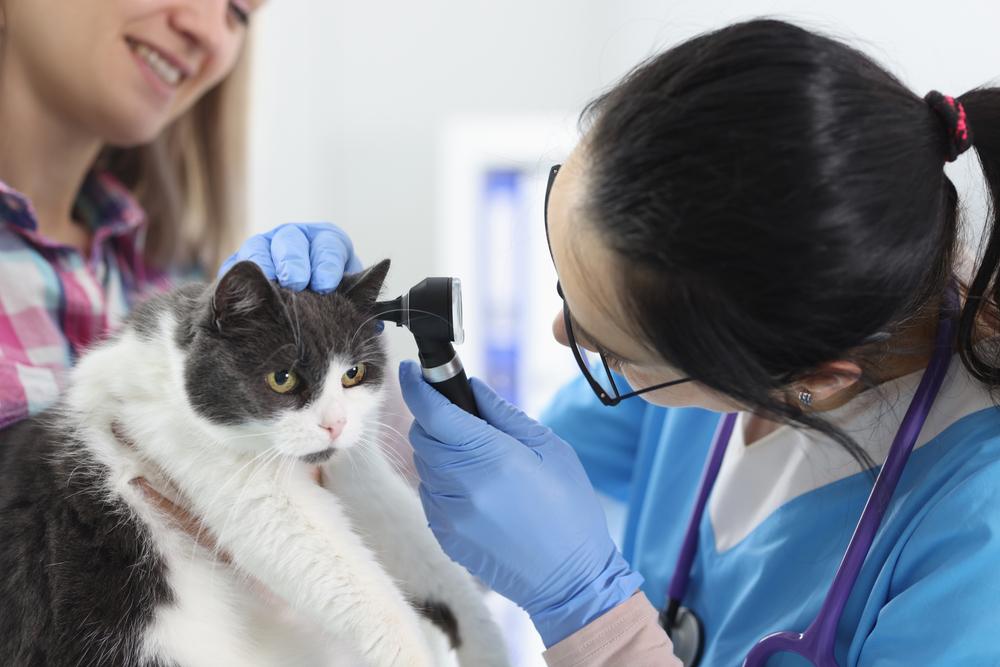

Burrowing into the ear canals, ear mites are the stuff of nightmares — and unfortunately, a common parasite in cats. Here's what to know about ear mites in cats, including how cats get them, signs of infection, treatment and prevention.
What Are Ear Mites in Cats?
Ear mites (Otodectis cynotis) are microscopic parasites that can live in the ear canals of cats, where they're shielded from grooming. They feed on skin cells, ear wax and even blood, leaving behind dark-colored debris and waste. Ear mites complete their entire three-week life cycle inside the ears, mating and reproducing on the skin's surface. They are extremely contagious and can cause a range of potential issues, such as inflammation, itching, hair loss and infection, along the way.

How Do Cats Get Ear Mites?
Cats contract ear mites through direct contact with infected animals. This is why they're common in pets living in or rescued from shared living spaces. Though they can't hop or fly, direct contact allows the mites to crawl from one host to the next. Shared items such as bedding or toys may contribute to transmission but aren't considered a primary source.
Cats of all ages can develop ear mite infections, but kittens and outdoor cats are at higher risk due to their increased exposure to other animals.
Can Cats Give Dogs Ear Mites?
Yes, cats can pass ear mites to dogs (and ferrets). If one pet in your household is diagnosed with ear mites, it's important to get the others evaluated and treated.
Can Cat Ear Mites Spread to Humans?
While humans aren't typically susceptible to ear mites, rare cases of temporary skin rashes have been reported in people who've had close contact with infected pets.
What Are the Signs of Ear Mites in Cats?
Ear mites tend to cause a consistent set of signs that are fairly easy for most pet parents to recognize. Classic signs include:
Frequent scratching at the ears
Head shaking or tilting
Rubbing the head on surfaces, such as furniture or floors
Hair loss around the ears
Dark, waxy discharge visible in ears
Bleeding or scabs in and around the ears
Abnormal odor from the ears
Swollen ears, which may result from a hematoma caused by excessive scratching
Ear Mites vs. Ear Wax in Cats
All cats produce some ear wax, which is typically light tan to clear brown in color and doesn't cause discomfort. The material associated with ear mites is altogether different: it appears darker (usually opaque, reddish-brown to black), sometimes resembling coffee grounds. It may be present in larger quantities and is usually accompanied by the previously mentioned signs of irritation, such as excessive scratching and head shaking.
Unlike normal ear wax, this buildup is a result of mite excrement and the dried blood and debris that comes from scratching. If your vet identifies this material, it signals an active infestation.

How to Get Rid of Ear Mites in Cats
While you may highly suspect ear mites based on your cat's physical signs, a proper diagnosis by your veterinarian is essential to getting your kitty the necessary care. During the exam, your vet will examine your cat's ear canal and eardrum using a tool called an otoscope, which gives them a closer look at the extent of the infection and helps them determine the safest and most effective treatment. Your vet will also examine a sample of the ear debris under a microscope to confirm the presence of mites, eggs and any secondary ear infections, such as bacteria and/or yeast.
Treatment typically starts with a thorough cleaning using an ear cleaner specifically formulated for cats to remove debris that could otherwise hinder the medication's effectiveness. Depending on your vet's recommendation, cleaning is usually followed by topical, oral or systemic medication to target the mites. They may also prescribe a medication to reduce inflammation and itching. Never use over-the-counter ear cleaning products without veterinary guidance, as some can be irritating or even toxic to the ears and damage the ear canal or eardrum.
How Long Does It Take to Get Rid of Ear Mites in Cats?
Considering that cats can have over 1,000 mites per ear, elimination doesn't happen overnight. An ear mite's life cycle spans about three weeks, so full resolution can take up to four weeks. Have your vet check (and treat if needed) any other household pets to prevent reinfestation. Wash and sanitize shared items like bedding and toys, and schedule a follow-up appointment with your vet to confirm the mites have been cleared and no signs of infection remain.
Prevention Tips
Ear mites may be a common nuisance for cats, but with prompt diagnosis and treatment, there's no major cause for concern. Left unchecked, ear mites can cause significant discomfort, lead to secondary infections and even result in hearing loss.
The good news is that you can help prevent these creepy crawlers: limit your cat's exposure to potentially infected animals, use vet-recommended preventives, and wash shared items like bedding and toys in the case of an ear mite infection. If your vet advises it, treat all pets in the household if one is diagnosed. Additionally, regular vet visits help catch issues early so your cat stays happy, healthy and itch-free!






















